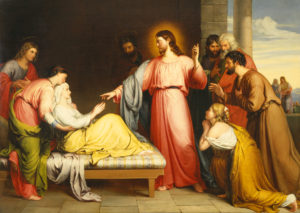Thoughts on Sunday’s Lessons for Feb. 4, 2018

Christ Healing the Mother of Simon Peter’s Wife by John Bridges (1839). Oil painting on canvas by John Bridges (1818–1854). Birmingham (Alabama) Museum of Art. (Click image to enlarge.)
We are approaching an early end to the season after Epiphany because Easter, and Lent before it, fall early this year. In Sunday’s Gospel, we’ll hear one more of Mark’s accounts of Jesus healing, throwing out demons, and telling the Good News before we move along to the Transfiguration, Ash Wednesday and Lent. (After Pentecost we’ll get back to the three Gospel readings from Mark that we skip over for now.) In our first reading, we hear the Prophet Isaiah reassuring the people in exile that though God may seem far away, they are not forgotten. The prophet poetically portrays a transcendent God who is far beyond our imagining. And yet this mighty, eternal and all-powerful God lifts us up on eagle’s wings and gives us the power and the strength to follow God’s ways.
Psalm: Psalm 147:1-12, 21c
Sunday’s Psalm, one of the six exuberant hymns of praise that bring the book of Psalms to its end, sings harmony with our Isaiah reading as it celebrates the glory of a God who is powerful and all-knowing. God is large enough to count and name even the stars of heaven, yet God is close to the people too, guiding them home from exile and binding their wounds. God is unimpressed by strength and might, yet cares deeply for the weak and lowly, gently tending the broken and the brokenhearted. In a liberating idea that we also hear when we read the Song of Mary, “The Lord lifts up the lowly, but casts the wicked to the ground.”
Second Reading: 1 Corinthians 9:16-23
Let’s be frank: Even for a worthy purpose, it’s not good to pretend to be something you’re not. But Paul is getting at something deeper than just being a moral chameleon when he claims to have been “all things to all people,” presenting himself in a voice separately tuned to the ears of Jews and Gentiles, believers and pagans, the strong and the weak. As in last week’s advice to take care not to be a stumbling block to others, Paul urges the fractious, often battling believers of Corinth to get over their divisions, loving one another and working together in spite of their differences so they can share the Gospel’s blessings.
Gospel: Mark 1:29-39
Jesus and his friends have left the synagogue at Capernaum to go to the home of his friends Simon and Andrew, where they find Simon’s mother-in-law sick with a fever, a serious and possibly life-threatening concern in that time. Jesus lifts her up, healing her with a touch. She promptly gets up to serve them, which might appear to be an instance of early gender roles. Take note, though that the Greek word for “serve” used here is “διηκόνει,” or “deacon,” the same word later used in Acts to name those who came forward to support the Apostles who were busy spreading the Gospel. Just as Simon’s mother-in-law served Jesus and the apostles, deacons vow to serve all people, particularly the poor, the weak, the sick, and the lonely.
